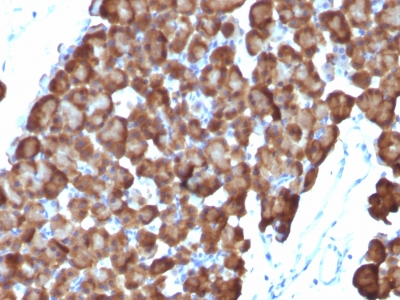Human and Rat Anti-Ornithine Decarboxylase-1 Antibody Product Attributes
Species: Human and Rat
Tested Applications: Flow Cytometry, Immunofluorescence, Western Blot, Immunohistochemistry (IHC).
Application Notes: Flow Cytometry (0.5-1ug of antibody/million cells in 0.1ml), Immunofluorescence (0.5-1ug of antibody/ml), Western Blot (0.5-1ug of antibody/ml), Immunohistochemistry (IHC) (Formalin-fixed) (0.25-0.5ug of antibody/ml for 30 minutes at RT)
Clonality: Monoclonal
Anti-Ornithine Decarboxylase-1 Antibody Clone: ODC1/486
Clone ODC1/486 Host and Isotype: Mouse IgG2a kappa
Anti-Human and Rat Ornithine Decarboxylase-1 Positive Control Sample: PC3 cells. Placenta, Prostate or Testicular carcinoma.
Cellular Localization of Antibody Cytoplasmic
Buffer and Stabilizer: 10mM PBS with 0.05% BSA & 0.05% azide.
Antibody Concentration: 200ug/ml
Antibody Purification Method:Protein A/G Purified
Immunogen: Recombinant human ODC-1 protein
Storage Conditions: Store at 2 to 8° C (refrigerate). Stable for 24 months when properly stored.
Ornithine Decarboxylase-1 Previously Observed Antibody Staining Patterns
Observed Subcellular, Organelle Specific Staining Data:
Anti-ODC1 antibody staining is expected to be primarily localized to the cytosol and plasma membrane.Observed Antibody Staining Data By Tissue Type:
Variations in Ornithine Decarboxylase-1 antibody staining intensity in immunohistochemistry on tissue sections are present across different anatomical locations. An intense signal was observed in hepatocytes in liver, exocrine glandular cells in the pancreas, decidual cells in the placenta, glandular cells in the salivary gland and small intestine and Leydig cells in the testis. More moderate antibody staining intensity was present in hepatocytes in liver, exocrine glandular cells in the pancreas, decidual cells in the placenta, glandular cells in the salivary gland and small intestine and Leydig cells in the testis. Low, but measureable presence of Ornithine Decarboxylase-1 could be seen inglandular cells in the appendix, hematopoietic cells in the bone marrow, adipocytes in breast, glandular cells in the breast, respiratory epithelial cells in the bronchus, glial cells in the caudate nucleus, neuronal cells in the caudate nucleus, cells in the granular layer in cerebellum, cells in the molecular layer in cerebellum, Purkinje cells in the cerebellum, endothelial cells in the cerebral cortex, glial cells in the cerebral cortex, neuronal cells in the cerebral cortex, neuropil in cerebral cortex, endothelial cells in the colon, cells in the endometrial stroma in endometrium, squamous epithelial cells in the esophagus, glial cells in the hippocampus, neuronal cells in the hippocampus, pneumocytes in lung, non-germinal center cells in the lymph node, squamous epithelial cells in the oral mucosa, glandular cells in the parathyroid gland and rectum, melanocytes in skin, epidermal cells in the skin, adipocytes in mesenchymal tissue, chondrocytes in mesenchymal tissue, fibroblasts in mesenchymal tissue, peripheral nerve in mesenchymal tissue, cells in the seminiferous ducts in testis, germinal center cells in the tonsil, non-germinal center cells in the tonsil, urothelial cells in the urinary bladder and squamous epithelial cells in the vagina. We were unable to detect Ornithine Decarboxylase-1 in other tissues. Disease states, inflammation, and other physiological changes can have a substantial impact on antibody staining patterns. These measurements were all taken in tissues deemed normal or from patients without known disease.Observed Antibody Staining Data By Tissue Disease Status:
Tissues from cancer patients, for instance, have their own distinct pattern of Ornithine Decarboxylase-1 expression as measured by anti-Ornithine Decarboxylase-1 antibody immunohistochemical staining. The average level of expression by tumor is summarized in the table below. The variability row represents patient to patient variability in IHC staining.| Sample Type | breast cancer | carcinoid | cervical cancer | colorectal cancer | endometrial cancer | glioma | head and neck cancer | liver cancer | lung cancer | lymphoma | melanoma | ovarian cancer | pancreatic cancer | prostate cancer | renal cancer | skin cancer | stomach cancer | testicular cancer | thyroid cancer | urothelial cancer |
|---|---|---|---|---|---|---|---|---|---|---|---|---|---|---|---|---|---|---|---|---|
| Signal Intensity | ++ | - | ++ | ++ | ++ | - | - | ++ | + | - | - | ++ | + | +++ | + | - | + | - | + | - |
| ODC1 Variability | ++ | ++ | ++ | ++ | + | + | ++ | ++ | ++ | + | ++ | ++ | ++ | + | ++ | ++ | ++ | + | + | ++ |
Limitations and Warranty
enQuire Bio's Ornithine Decarboxylase-1 Anti-Human, Rat Monoclonal is available for Research Use Only. This antibody is guaranteed to work for a period of two years when properly stored.

.jpg)

.jpg)


-178x178.jpg)
-178x178.jpg)
-178x178.jpg)
-178x178.jpg)
There are no reviews yet.